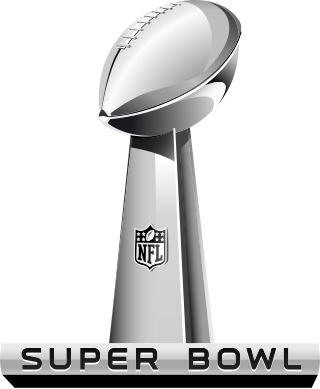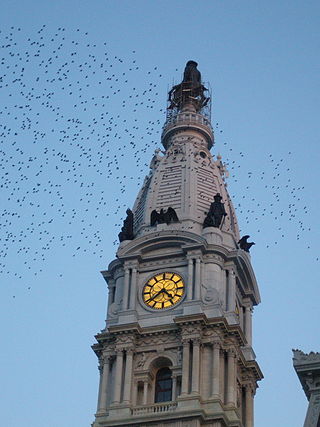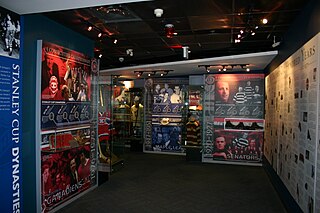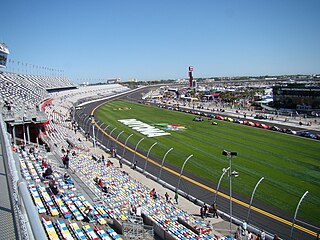In the history of championships in major professional sports leagues in the United States and Canada (which include the NFL, MLB, NBA, and NHL), a city/metropolitan area has been home to multiple championships in a season 19 times, most recently in 2020 when the Tampa Bay Lightning won the 2020 Stanley Cup and Tampa Bay Buccaneers won Super Bowl LV. [1] 2020 was also the first season where two different cities won multiple championships, with the Los Angeles Lakers winning the 2020 NBA Finals and the Los Angeles Dodgers winning the 2020 World Series. New York City is the only city to win multiple titles in back-to-back seasons, doing so in 1926–1927 and 1927–1928. [2] No city has ever won more than two championships in the four major sports in the same season. As of 2024, all 19 occurrences have been in American cities; no Canadian city has yet accomplished this feat.
A city has been home to multiple championships in a calendar year 18 times. This has not happened the same number of times as a city winning multiple championships in one season, as a city can win two titles in a season without those titles being in the same calendar year (for example, the New York Jets and New York Mets both won titles in the 1969 calendar year, but the Jets Super Bowl III win was for the 1968 season; likewise the Baltimore Colts and Baltimore Orioles both won championships in the 1970 season, but the Colts Super Bowl V win came in 1971). This most recently happened in 2021 when the Tampa Bay Buccaneers won Super Bowl LV and Tampa Bay Lightning won the 2021 Stanley Cup, their second in a row. [1] Like with single season championships, New York City is the only city to win multiple titles in back-to-back calendar years, doing so in 1927 and 1928. [2] Also like with single season championships, no city has won more than two titles in a single calendar year.
Philadelphia is the only city to have all four major sports teams (MLB's Phillies, NBA's 76ers, NFL's Eagles, and NHL's Flyers) play in their respective championship game or series in the same season (1980), though only one of the four (Phillies) actually won the championship. [3] The Tampa Bay area, which does not have an NBA team, had all three of its major sports teams (MLB's Rays, NFL's Buccaneers, and NHL's Lightning) play in their respective championships in the 2020 season, with the Lightning and Buccaneers winning the championships. [1]
Because some of the present-day "big four" North American sports leagues have merged with other leagues and their championships in the past, this article considers the following to be major sports championships:
Teams which are based in the same metropolitan area are considered together for this article even if they are not based in the same city. For example, teams representing Oakland, California are grouped with other teams based in the San Francisco Bay Area and teams playing in or representing New Jersey are grouped with other teams based in the New York City metropolitan area.
While the Super Bowl game is held in February (January prior to 2002), a Super Bowl championship is considered to be the championship for the year in which the regular season was played; for example, Super Bowl LIII, played on February 3, 2019, was the championship game for the 2018 NFL season and is thus considered a 2018 championship. All other championships including pre-Super Bowl football championships are considered to have been won the year in which the championship was awarded.
| Year | City or metro area | Team | League | Team | League | Team | League |
|---|---|---|---|---|---|---|---|
| 1927 [4] | New York City | Giants | NFL | Yankees | MLB | ||
| 1928 [2] | New York City | Rangers | NHL | Yankees | MLB | ||
| 1933 [4] | New York City | Rangers | NHL | Giants | MLB | ||
| 1935 [4] | Detroit | Lions | NFL | Tigers | MLB | ||
| 1938 [4] | New York City | Giants | NFL | Yankees | MLB | ||
| 1948 [4] | Cleveland | Browns | AAFC | Indians | MLB | ||
| 1952 [4] | Detroit | Lions | NFL | Red Wings | NHL | ||
| 1956 [4] | New York City | Giants | NFL | Yankees | MLB | ||
| 1970 [4] | Baltimore | Colts | NFL | Orioles | MLB | ||
| 1979 [4] | Pittsburgh | Steelers | NFL | Pirates | MLB | ||
| 1986 [4] | Greater New York | Giants | NFL | Mets | MLB | ||
| 1988 [4] | Los Angeles | Lakers | NBA | Dodgers | MLB | ||
| 1989 [2] | San Francisco Bay Area | Athletics | MLB | 49ers | NFL | ||
| 2000 [4] | Greater New York | Devils | NHL | Yankees | MLB | ||
| 2002 [4] | Greater Los Angeles | Lakers | NBA | Angels | MLB | ||
| 2004 [4] | Greater Boston | Patriots | NFL | Red Sox | MLB | ||
| 2018 [4] | Greater Boston | Patriots | NFL | Red Sox | MLB | ||
| 2020 [4] | Los Angeles | Lakers | NBA | Dodgers | MLB | ||
| 2020 [1] | Tampa | Buccaneers | NFL | Lightning | NHL |
| City or metro area | Number of times winning multiple championships in one season |
|---|---|
| Greater New York | 7 |
| Greater Los Angeles | 3 |
| Greater Boston | 2 |
| Detroit | 2 |
| Baltimore | 1 |
| Cleveland | 1 |
| Pittsburgh | 1 |
| San Francisco Bay Area | 1 |
| Tampa | 1 |
| Year | City | Team | League | Team | League | Team | League |
|---|---|---|---|---|---|---|---|
| 1927 [2] | New York City | Giants | NFL | Yankees | MLB | ||
| 1928 [2] | New York City | Rangers | NHL | Yankees | MLB | ||
| 1933 [2] | New York City | Rangers | NHL | Giants | MLB | ||
| 1935 [2] | Detroit | Lions | NFL | Tigers | MLB | ||
| 1938 [2] | New York City | Giants | NFL | Yankees | MLB | ||
| 1948 [2] | Cleveland | Browns | AAFC | Indians | MLB | ||
| 1952 [2] | Detroit | Lions | NFL | Red Wings | NHL | ||
| 1956 [2] | New York City | Giants | NFL | Yankees | MLB | ||
| 1969 [2] | New York City | Jets | NFL | Mets | MLB | ||
| 1979 [2] | Pittsburgh | Steelers | NFL | Pirates | MLB | ||
| 1988 [5] | Los Angeles | Dodgers | MLB | Lakers | NBA | ||
| 1989 [2] | San Francisco Bay Area | 49ers | NFL | Athletics | MLB | ||
| 2000 [2] | Greater New York | Devils | NHL | Yankees | MLB | ||
| 2002 [2] | Greater Los Angeles | Lakers | NBA | Angels | MLB | ||
| 2004 [5] | Greater Boston | Patriots | NFL | Red Sox | MLB | ||
| 2009 [5] | Pittsburgh | Steelers | NFL | Penguins | NHL | ||
| 2020 [5] | Los Angeles | Lakers | NBA | Dodgers | MLB | ||
| 2021 [1] | Tampa | Buccaneers | NFL | Lightning | NHL |
| City or metro area | Number of times winning multiple championships in one calendar year |
|---|---|
| Greater New York | 7 |
| Greater Los Angeles | 3 |
| Detroit | 2 |
| Pittsburgh | 2 |
| Greater Boston | 1 |
| Cleveland | 1 |
| San Francisco Bay Area | 1 |
| Tampa | 1 |

The Super Bowl is the annual league championship game of the National Football League (NFL) of the United States. It has served as the final game of every NFL season since 1966, replacing the NFL Championship Game. Since 2022, the game has been played on the second Sunday in February. Prior Super Bowls were played on Sundays in early to mid-January from 1967 to 1978, late January from 1979 to 2003, and the first Sunday of February from 2004 to 2021. Winning teams are awarded the Vince Lombardi Trophy, named after the eponymous coach who won the first two Super Bowls. Because the NFL restricts the use of its "Super Bowl" trademark, it is frequently referred to as the "big game" or other generic terms by non-sponsoring corporations. The day the game is held is commonly referred to as "Super Bowl Sunday" or simply "Super Sunday".

The Tampa Bay Buccaneers are a professional American football team based in Tampa, Florida. The Buccaneers compete in the National Football League (NFL) as a member of the National Football Conference (NFC) South division. They joined the NFL in 1976 as an expansion team, along with the Seattle Seahawks, and played its first season in the American Football Conference (AFC) West division.

Super Bowl XXXVII was an American football game between the American Football Conference (AFC) champion Oakland Raiders and the National Football Conference (NFC) champion Tampa Bay Buccaneers to decide the National Football League (NFL) champion for the 2002 season. The Buccaneers defeated the Raiders by the score of 48–21, tied with Super Bowl XXXV for the seventh-largest Super Bowl margin of victory, winning their first-ever Super Bowl. The game was played on January 26, 2003, at Qualcomm Stadium in San Diego, California.
A draft is a process used in some countries and sports to allocate certain players to teams. In a draft, teams take turns selecting from a pool of eligible players. When a team selects a player, the team receives exclusive rights to sign that player to a contract, and no other team in the league may sign the player. The process is similar to round-robin item allocation.

The Curse of Billy Penn (1987–2008) was a sports-related curse, urban legend, and popular explanation for the failure of major Philadelphia professional sports teams to win championships following the March 1987 construction of the One Liberty Place skyscraper, which exceeded the height of William Penn's statue atop Philadelphia City Hall. For decades prior to the construction of One Liberty Place, there had been a gentlemen's agreement in place to ensure that no building in Philadelphia would be permitted to be higher than the William Penn statue atop Philadelphia City Hall.
The National Football Conference – Northern Division or NFC North is one of the four divisions of the National Football Conference (NFC) in the National Football League (NFL). Nicknamed the "Black and Blue Division" for the rough and tough rivalry games between the teams, it currently has four members: the Chicago Bears, Detroit Lions, Green Bay Packers, and Minnesota Vikings, with the latter three based within most definitions of the Upper Midwest. The NFC North was previously known as the NFC Central from 1970 to 2001. The Tampa Bay Buccaneers were previously members, from 1977, one year after they joined the league as an expansion team, until 2002 when they moved to the NFC South. The division was created in 1967 as the Central Division of the NFL's Western Conference and existed for three seasons before the AFL–NFL merger. After the merger, it was renamed the NFC Central and retained that name until the NFL split into eight divisions in 2002. The four current division teams have been together in the same division or conference since the Vikings joined the league in 1961. The Bears, Lions and Packers have been in the same division or conference since the NFL began a conference format in 1933. Largely because the four teams have played each other at least twice a year, with the exception of the strike-shortened 1982 season, for more than 60 years, the entire division is considered one very large rivalry.

The War on I–4 was a rivalry between the Tampa Bay Storm and the Orlando Predators in the Arena Football League. The teams met at least twice and up to four times a season starting in 1991, and both were consistently at the top of the league standings. The rivalry has been compared to the Yankees – Red Sox rivalry in Major League Baseball.
The National Football Conference – Southern Division or NFC South is one of the four divisions of the National Football Conference (NFC) in the National Football League (NFL). It was created prior to the 2002 NFL season, when the league realigned divisions after expanding to 32 teams. The NFC South currently has four member clubs: the Atlanta Falcons, Carolina Panthers, New Orleans Saints, and Tampa Bay Buccaneers.
The American Football Conference – Western Division or AFC West is one of the four divisions of the American Football Conference (AFC) in the National Football League (NFL). The division comprises the Denver Broncos, Kansas City Chiefs, Las Vegas Raiders, and Los Angeles Chargers.

In sports, a dynasty is a team or individual that dominates their sport or league for an extended length of time. Some leagues usually maintain official lists of dynasties, often as part of a hall of fame, but in many cases, whether a team or individual has achieved a dynasty is subjective. This can result in frequent topic of debate among sports fans due to lack of consensus and agreement in the many different variables and criteria that fans may use to define a sports dynasty. Merriam-Webster describes a dynasty as a "sports franchise which has a prolonged run of successful seasons". Within the same sport, or even the same league, dynasties may be concurrent with each other. This is a list of teams that have been called a dynasty after periods of success. In sports, a dynasty denotes a team or individual that dominated their sport or league for an extended period. The use of the term to characterize such prolonged success emerged in the early 20th century.

A championship ring or premiership ring is a ring presented to members of winning teams in North American professional sports leagues, and college tournaments.

The Greater Los Angeles area is home to many professional and collegiate sports teams and has hosted many national and international sporting events. The metropolitan area has twelve major league professional teams: the Los Angeles Dodgers, the Los Angeles Lakers, the Los Angeles Rams, the Los Angeles Angels, the Los Angeles Chargers, the Los Angeles Clippers, Los Angeles FC, the LA Galaxy, the Los Angeles Kings, the Anaheim Ducks, the Los Angeles Sparks, and Angel City FC of the National Women's Soccer League. The Los Angeles metropolitan area is home to nine universities whose teams compete in various NCAA Division I level sports, most notably the UCLA Bruins and USC Trojans. Between them, these Los Angeles area sports teams have won a combined 105 championship titles. Los Angeles area colleges have produced upwards of 200 national championship teams.
The Super Bowl curse is a phrase that refers to phenomena that may occur in the National Football League (NFL) where the team whose stadium will host the upcoming Super Bowl either misses the playoffs or suffers early postseason elimination.

The Tampa Bay area is home to many sports teams and has a substantial history of sporting activity. Most of the region's professional sports franchises use the name "Tampa Bay", which is the name of a body of water, not of any city. This is to emphasize that they represent the wider metropolitan area and not a particular municipality and was a tradition started by Tampa's first major sports team, the original Tampa Bay Rowdies, when they were founded in 1975.

The U.S. state of Florida has three National Football League teams, two Major League Baseball teams, two National Basketball Association teams, two National Hockey League teams, two Major League Soccer teams and 13 NCAA Division I college teams.

Super Bowl LV was an American football game played to determine the champion of the National Football League (NFL) for the 2020 season. The National Football Conference (NFC) champion Tampa Bay Buccaneers defeated the defending American Football Conference (AFC) and Super Bowl champion Kansas City Chiefs, 31–9. The game was played on February 7, 2021, at Raymond James Stadium in Tampa, Florida, the home stadium of the Buccaneers, marking the first time a team played a Super Bowl in its home stadium. Due to COVID-19 protocols limiting the stadium's seating capacity to 25,000 fans, it was the least-attended Super Bowl.

Tevita Tuliʻakiʻono Tuipulotu Mosese Vaʻhae Fehoko Faletau Vea, otherwise known as Vita Vea, is an American professional football nose tackle for the Tampa Bay Buccaneers of the National Football League (NFL). He played college football for the Washington Huskies and was selected by the Buccaneers in the first round of the 2018 NFL draft. Vea won Super Bowl LV with the team over the Kansas City Chiefs, and was selected to the Pro Bowl the following year.

Justin Howard Watson is an American professional football wide receiver for the Kansas City Chiefs of the National Football League (NFL). He played college football at Penn and was drafted by the Tampa Bay Buccaneers in the fifth round of the 2018 NFL draft. Watson is a three-time Super Bowl champion, winning Super Bowl LV with the Buccaneers and Super Bowl LVII and LVIII with the Chiefs.
{{cite web}}: |last= has generic name (help)